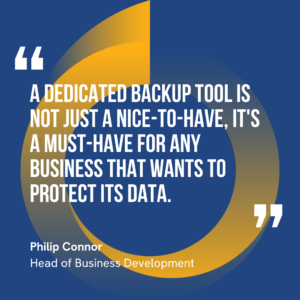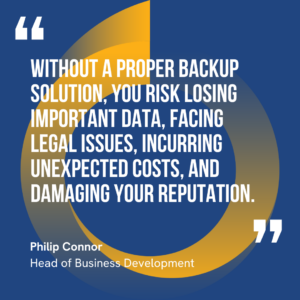Are you solely relying on Microsoft 365 to back up your data? A very common misconception amongst SMB owners and IT managers is that Microsoft 365 provides sufficient backup and security. If you think your Microsoft 365 subscription is enough to protect your data, it’s important to understand that while it offers some built-in protections, it might not be as comprehensive as you need – potentially leaving your business vulnerable.
As a cyber security expert at Babble, I’ve seen first-hand how businesses struggle with data protection. I work with Microsoft tools every day, so I know exactly what they can and can’t do. I’m here to explain why relying solely on Microsoft 365 for data backup is a big mistake.
In this article, I’ll break down the core functions of Microsoft 365’s native backup capabilities and its limitations, and discuss how a third-party solution like Acronis can fill the gaps and provide comprehensive data protection. I’ll also share some pro tips to help you enhance your data protection strategy. By the end you will understand why Microsoft 365’s built-in backup is not as safe as you think.
–
Reading Time: 7 minutes
What This Blog Covers:
The Myth: “Microsoft 365 Handles My Backup Needs”
Let’s kick things off with some myth busting: many SMB owners and IT managers believe that Microsoft 365, on its own, offers comprehensive backup (or what we in the tech field call “redundancy”). While Microsoft 365 does have some redundancy and “resiliency” – meaning that it helps to keep things running smoothly in the event of catastrophe – it is not a comprehensive backup solution. It’s kind of like having a safety net, but it’s not as robust as you might think.

Microsoft 365’s Native Capabilities
Now that we’ve dispelled that common misconception, let’s break down what its “resiliency” or “redundancy” means in practice:
- Deleted Items: If you delete something in your Microsoft environment – like an email or document – it doesn’t vanish into thin air, it goes to your deleted items folder.
- Recycle Bin: Now, if you delete something from your deleted items, or if you delete files and folders from SharePoint and OneDrive, they go into a recycle bin. It’s like the second level of your digital trash system.
- Retention Period: Here’s the catch: Microsoft keeps these items in the recycle bin for about 90 days (93 for services like SharePoint Online and OneDrive for Business). After that, they are permanently deleted. Microsoft gets rid of it because indefinitely storing deleted items in their data centres would be too costly for them and just wouldn’t make sense.
- File Versioning: Microsoft 365 also has some helpful features like version history in SharePoint and OneDrive. When you’re collaborating on a file, it saves different versions as people jump in and out, which is great for tracking changes. By default, there are around 30 versions of each document. As useful as this is, it’s not a backup — it’s version control. It’s important to remember that if you delete the entire document, it goes straight to the recycle bin and is subject to the same 90-day deletion rule.
 So, while Microsoft 365 gives you a little bit of breathing room with deleted items and a recycle bin, it doesn’t actually back your data up, but saves it for a relatively short period of time. The main takeaway is that if you delete something by accident, and it sits there in the recycle bin for more than 90 days it’s gone forever.
So, while Microsoft 365 gives you a little bit of breathing room with deleted items and a recycle bin, it doesn’t actually back your data up, but saves it for a relatively short period of time. The main takeaway is that if you delete something by accident, and it sits there in the recycle bin for more than 90 days it’s gone forever.
The Biggest Gaps and Why They Matter
With data being worth more than gold, it only makes sense to protect it at all costs – especially when we start talking about cyber threats. Microsoft offers a host of tools that have cyber security backup features. This further speaks to the fact that Microsoft 365 on its own is definitely not enough to cover all your needs. So, what are the main shortcomings?
- Limited Timeframe: The 90-day retention period is a major limitation. That’s a pretty tight window, especially when you’re busy running a business.
- Accidental Deletion: Microsoft 365 is not human error-proof. If you accidentally delete something important and don’t notice for three months, it goes straight to the recycle bin, and the clock starts ticking. Once 90 days have passed that data is gone for good and there’s no way to get it back.
- No Warnings: Here’s another catch: there are no reminders about items in the recycle bin that are about to be permanently deleted. There’s no handy alert that says, “Hey, this file is about to vanish!”. It’s up to you to keep on top of your data.
- No Coverage for Legal Requirements: If your company needs to keep data for a long time for legal reasons, Microsoft 365’s features simply won’t cut it. Some companies in construction, architecture, or the legal profession need to keep files for 9, 10, or even 15 years. The 90-day rule means you could find yourself in some real hot water with a client who, for example, asks for a file you mistakenly deleted two years ago.
- Not a True Backup: We’ve touched on this already, but it’s worth repeating before we move on: the versioning is great for tracking changes, but it is not an actual backup. This means if you delete the entire document, version history isn’t going to save it.
No matter what industry you’re in, there’s a lot at stake when it comes to data management. The real risk is that you might not even realise you’ve deleted something important until it’s too late. You might go on a sabbatical, or you might just forget that you deleted it. Next thing you know, four months later you need to reference that Word document in an important pitch you’re presenting to a major client in a few days and it’s nowhere to be found. This is where a proper backup solution really comes in handy. If you delete something by accident, a backup tool doesn’t delete it, it remains safe and sound – which brings me to my next point.
Why You Need a Dedicated Backup Solution
Here’s why you need that extra layer of security:
- Extra Resilience: A dedicated backup tool keeps your data safe even if you delete it – there’s no looming 90 day window. This means that your data is protected from accidental deletions and human error.
- Extended Data Retention: There are many reasons why you may need to hold on to your data for a long period of time. A proper backup solution allows you to do this.
- Protection Against Cyber Threats: If a hacker gets into your Microsoft 365 account, they could delete or steal all your data. Without a backup, you’re in serious trouble. They could lock you out of your account, or they could put something across all the data, or try to harvest it. A proper backup solution safeguards your data against these threats.
- Protection from Disgruntled Employees: It’s not just external threats you need to worry about. You might have a conversation with a disgruntled employee, and they could maliciously delete a load of data from a small file per se, and you might not even realise it until they’re long gone. A backup solution will protect you even then.
- Safeguard Against Human Error: Let’s face it, we all make mistakes. Most of us find ourselves juggling a million things at a time, making it all too easy to accidentally delete something without realising it. A backup is there to help when this happens, allowing you to restore lost data and keep your business running smoothly.
- Complete Data Protection: It’s important to remember that Microsoft 365 does not provide complete protection against all forms of data loss. Many people automatically think that they have complete data protection when they have Microsoft 365, but again, this is not the case. A proper backup solution is essential for complete data protection.
 Having a comprehensive backup solution is not just about improving data hygiene, but is more so a best practice when it comes to strengthening your cyber security. If you don’t have a backup in place, you might not have other security measures in place. For example, you may not have Multi-Factor Authentication (MFA) turned on, which makes your account vulnerable. We’ve spoken before about how SMBs are the primary targets in the rise of cyber threats. If someone gets into your account, they could delete all your data and lock you out of your account. You could have a lawsuit on your hands if you have to declare that customer data has been compromised. Then there’s the additional cost of trying to retrieve said data from a hacker (which isn’t exactly full proof by the way).
Having a comprehensive backup solution is not just about improving data hygiene, but is more so a best practice when it comes to strengthening your cyber security. If you don’t have a backup in place, you might not have other security measures in place. For example, you may not have Multi-Factor Authentication (MFA) turned on, which makes your account vulnerable. We’ve spoken before about how SMBs are the primary targets in the rise of cyber threats. If someone gets into your account, they could delete all your data and lock you out of your account. You could have a lawsuit on your hands if you have to declare that customer data has been compromised. Then there’s the additional cost of trying to retrieve said data from a hacker (which isn’t exactly full proof by the way).
Enter Acronis: Filling the Microsoft 365 Backup Gaps
So, we’ve established that relying solely on Microsoft 365 for backup isn’t the best idea. That’s why I strongly suggest using a separate vendor like Acronis (one of our trusted partners). They are industry leaders in what they do. While there are other vendors out there, we at Babble have developed a great relationship with Acronis. Here’s why I’m a fan of their work:
- Comprehensive Backup and Recovery: Acronis provides complete backups that are easy to recover. They are industry leading in what they do in terms of cyber backup.
- Advanced Security: Acronis has top-notch security, including protection against ransomware. They also encrypt data at rest, ensuring that your data remains secure at all times.
- Seamless Integration: Acronis integrates seamlessly with Microsoft 365, with the added benefit of being easy to use.
- Global Data Centres: Acronis has data centres all over the world. This is important for companies with satellite offices or those needing data stored in specific regions. If you need to have data in a certain region for legal reasons, you can do that with Acronis.
- Data Separation: Having your data backed up with a different company from Microsoft is just good business. If something happens to Microsoft, your data is still safe. It’s good to have your data stored with another company and not put all your eggs in one basket.
I can personally attest to the fact that the Acronis team are a great bunch to work with. They have an excellent product, which we have vetted and used ourselves. Valued partnership aside, the reasons why we use Acronis is because of their industry-leading security solutions, the way they encrypt data, and their global data centres.
Don’t Wait for Disaster: Secure Your Data Now
Making sure that every single person in your organisation is practicing good data hygiene is a lot to think about when you are managing your business. Babble is here to help you take the proper steps to protect your data and avoid catastrophe.
 Remember, while Microsoft 365 provides some great tools, it doesn’t offer complete data protection. So, relying solely on Microsoft 365 for data backup leaves you vulnerable and exposed to all kinds of threats.
Remember, while Microsoft 365 provides some great tools, it doesn’t offer complete data protection. So, relying solely on Microsoft 365 for data backup leaves you vulnerable and exposed to all kinds of threats.
As a Microsoft cyber security expert at Babble, I’ve seen firsthand how not taking data backup seriously can take a business of any size out at the knees. My goal is to help you understand these risks and make informed decisions to protect your business.
The time to properly back up your data is now. We partner with industry leading vendors like Acronis to provide you with best-in-class backup solutions to keep your data safe. This gives you access to comprehensive backup and recovery, advanced security, seamless integration, global data centres, and data separation.




